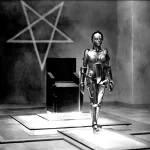The Black Panthers: Vanguard of the Revolution: They Were Revolutionaries, by David Bax
Stanley Nelson’s galvanizing new documentary, The Black Panthers: Vanguard of the Revolution, makes clear from the opening minutes that it has as much to say about the burning, immediate present as it does about the past it details. In setting up the national mood that gave birth to the Panthers, Nelson shows us shockingly violent footage of police brutality against blacks in the 1960s. It’s impossible not to be reminded of Freddie Gray or Eric Garner or Sandra Bland or countless other recent examples of the same thoughtless inhumanity. It’s also frustrating to realize that catching such acts on camera doesn’t lead to justice any more now than it did then. In setting the tone in such a way, Nelson makes clear that his film is no mere historical account. It’s a smoking gun; a pointed finger; a call to action.
In telling of the rise and fall of the Black Panthers, Nelson does not adhere to strict chronology, smartly choosing instead to follow a sort of emotional continuity of events while still remaining focused on facts over conjecture. He’s also careful to point out something that has often been overlooked, namely that women formed the backbone of the Panthers and that the party’s downfall was all but assured once it started alienating them.
Still, it’s the rise, not the fall, that really gets the blood pumping. The Black Panthers started out by following cops around the streets of Oakland with loaded guns, standing back but watching to ensure police activity was carried out respectfully. At the time, this was legal in California and these actions are the main reason it’s not now. The word “militant” has come to be a signifier of overzealousness but Nelson seeks to rescue it. If your enemy has an army (the police), it’s perfectly reasonable for you to form one in response. This is just a part of Nelson’s larger goal to restore the Panthers’ reputation as less a political movement than a revolutionary one. The word revolution (spoken countless times in interviews and footage) is not used metaphorically here. In the 1960s, nations across the world were violently establishing their independence and the Black Panthers saw themselves as part and parcel of that progression. Nelson does not mitigate or temper these motivations. One former Panther describes his mental state during a shootout with the police thusly: “I felt free. I was a free negro.”
In the footage we see of protests and rallies, there are white faces to be found among the crowd but they stand out in the same way a handful of token black characters would stick out in a mostly white movie. It’s a visual signifier of the Panthers’ stance on whites. These friendly few are the exception to the rule. White people are, if not the enemy, at the very least the other. One interviewee, in discussing the assassination of Martin Luther King, Jr., doesn’t mention James Earl Ray but merely says that “they” killed him. There’s no question to whom he is referring. A white viewer (like myself) may shift nervously in his seat but it’s an edifying discomfort, a welcome corrective to under-examined cultural hegemony.
In the present day interviews, many of the white faces represent the opposition, particularly Los Angeles cops. Their participation and Nelson’s research into the actions taken toward the Panthers by law enforcement in general form one of Vanguard’s strongest arcs. With plenty of testimony, footage and documentation, he lays out the strategies and manipulations used to tear down the party. An older interview with an FBI informant who went undercover in the highest ranks of the Chicago Panthers, as well as a newer one with a former Chicago cop, detail the FBI’s course of action (under “Cointelpro,” or Counter Intelligence Program), stocking the Panthers with weapons in order to give the local police cause to perform raids, at least one of which (the killing of Fred Hampton) was a barely disguised assassination.
One of those Los Angeles cops recounts a story of patrolling his beat in a black neighborhood during the height of the Panther era. His friendly greeting to a four year old girl was met with her cold response: “Fuck you, pig.” In the present day, the cop shakes his head, not in humility but a schoolmarmish kind of dismay. All these years later and still too many white authorities refuse to recognize what they – what we – have done to earn the ire of a large portion of the American population. Maybe Vanguard of the Revolution will help.




























